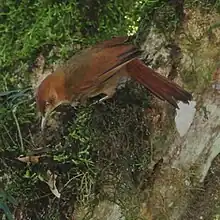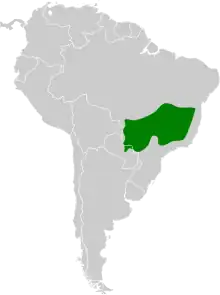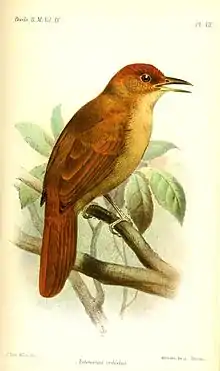Henna-capped foliage-gleaner
The henna-capped foliage-gleaner or chestnut-capped foliage-gleaner[2] (Clibanornis rectirostris) is a species of bird in the Furnariinae subfamily of the ovenbird family Furnariidae. It is found in Brazil and Paraguay.[3]
| Henna-capped foliage-gleaner | |
|---|---|
 | |
| at Jacutinga, Minas Gerais State, Brazil | |
| Scientific classification | |
| Domain: | Eukaryota |
| Kingdom: | Animalia |
| Phylum: | Chordata |
| Clade: | Dinosauria |
| Class: | Aves |
| Order: | Passeriformes |
| Family: | Furnariidae |
| Genus: | Clibanornis |
| Species: | C. rectirostris |
| Binomial name | |
| Clibanornis rectirostris (Wied, 1831) | |
 | |
| Synonyms | |
| |
Taxonomy and systematics
The henna-capped foliage-gleaner has previously been placed in genera Automolus and Hypocryptus but genetic data place it firmly in Clibanornis. It and the canebrake groundcreeper (c. dendrocolaptoides) are sister species.[4][5]
The henna-capped foliage-gleaner is monotypic.[3]

Description
The henna-capped foliage-gleaner is 20 to 21 cm (7.9 to 8.3 in) long and weighs 44 to 51 g (1.6 to 1.8 oz). It is a largish furnariid with a long almost straight bill. The sexes have the same plumage. Adults have a chestnut face with a light rufous moustacial area. Their crown is chestnut that becomes a slightly paler reddish chestnut collar and a rich ochraceous brown back and rump. Their uppertail coverts are chestnut. Their wings are mostly dark rufous and their tail chestnut. Their throat is pale rufous that becomes slightly darker on their breast and belly. Their flanks are darker rufescent brown and their undertail coverts reddish-rufous.Their iris is sulphur-yellow, their bill dark gray with a paler base to the mandible, and their legs and feet grayish.[6][7][8]
Distribution and habitat
The henna-capped foliage-gleaner is found in south-central Brazil between the states of Mato Grosso, Bahia, and Paraná and into eastern Paraguay's San Pedro Department. It inhabits gallery forest and also deciduous woodlands at elevations between 200 and 1,000 m (700 and 3,300 ft).[6][7][8]
Behavior
Movement
The henna-capped foliage-gleaner is a year-round resident throughout its range.[6]
Feeding
The henna-capped foliage-gleaner feeds on arthropods. It forages mostly by itself or in pairs and is thought to occasionally join mixed-species feeding flocks. It is mostly terrestrial and gleans its prey from the ground and leaf litter.[6]
Breeding
The henna-capped foliage-gleaner is assumed to be monogamous. It makes a nest of dry grass and leaves in a tunnel it excavates in an earthen bank. Nothing else is known about its breeding biology.[6]
Vocalization
The henna-capped foliage-gleaner's call is a "dry, cackling 'kjep -kjep - -". Its song is like the call "but accelerating to a rattle, in total lasting 2-3 sec."[7]
Status
The IUCN originally in 1988 assessed the henna-capped foliage-gleaner as Near Threatened but since 2000 has rated it as being of Least Concern. It has a fairly large range but its population size is not known and is believed to be decreasing. "The species is presumably threatened by selective logging and agricultural conversion of forested areas within the Brazilian planalto, and more information is required regarding population size and trends."[1] It is rather poorly known and considered rare to uncommon.[6]
References
- BirdLife International (2018). "Chestnut-capped Foliage-gleaner Clibanornis rectirostris". IUCN Red List of Threatened Species. 2018: e.T22702949A130279567. doi:10.2305/IUCN.UK.2018-2.RLTS.T22702949A130279567.en. Retrieved 5 September 2023.
- Clements, J. F., T. S. Schulenberg, M. J. Iliff, T. A. Fredericks, J. A. Gerbracht, D. Lepage, S. M. Billerman, B. L. Sullivan, and C. L. Wood. 2022. The eBird/Clements checklist of birds of the world: v2022. Downloaded from https://www.birds.cornell.edu/clementschecklist/download/ retrieved November 10, 2022
- Gill, Frank; Donsker, David; Rasmussen, Pamela, eds. (July 2023). "Ovenbirds, woodcreepers". IOC World Bird List. v 13.2. Retrieved July 31, 2023.
- Derryberry, E. P., S. Claramunt, G. Derryberry, R. T. Chesser, J. Cracraft, A. Aleixo, J. Pérez-Emán, J. V. Remsen, Jr., and R. T. Brumfield. (2011). Lineage diversification and morphological evolution in a large-scale continental radiation: the Neotropical ovenbirds and woodcreepers (Aves: Furnariidae). Evolution 65(10):2973–2986. https://doi.org/10.1111/j.1558-5646.2011.01374.x
- Claramunt, Santiago; Derryberry, Elizabeth P.; Cadena, Carlos Daniel; Cuervo, Andrés M.; Sanín, Camilo; Brumfield, Robb T. (2013). "Phylogeny and classification of Automolus foliage-gleaners and allies (Furnariidae)". The Condor. 115 (2): 375–385. doi:10.1525/cond.2013.110198. ISSN 0010-5422. S2CID 59375772.
- Remsen, Jr., J. V. (2020). Chestnut-capped Foliage-gleaner (Clibanornis rectirostris), version 1.0. In Birds of the World (J. del Hoyo, A. Elliott, J. Sargatal, D. A. Christie, and E. de Juana, Editors). Cornell Lab of Ornithology, Ithaca, NY, USA. https://doi.org/10.2173/bow.ccfgle1.01 retrieved September 5, 2023
- van Perlo, Ber (2009). A Field Guide to the Birds of Brazil. New York: Oxford University Press. p. 226. ISBN 978-0-19-530155-7.
- de la Peña, Martín R.; Rumboll, Maurice (2001). Birds of Southern South America and Antarctica. Princeton Illustrated Checklists. New Jersey: Princeton University Press. pp. Plate 65. ISBN 0691090351.
